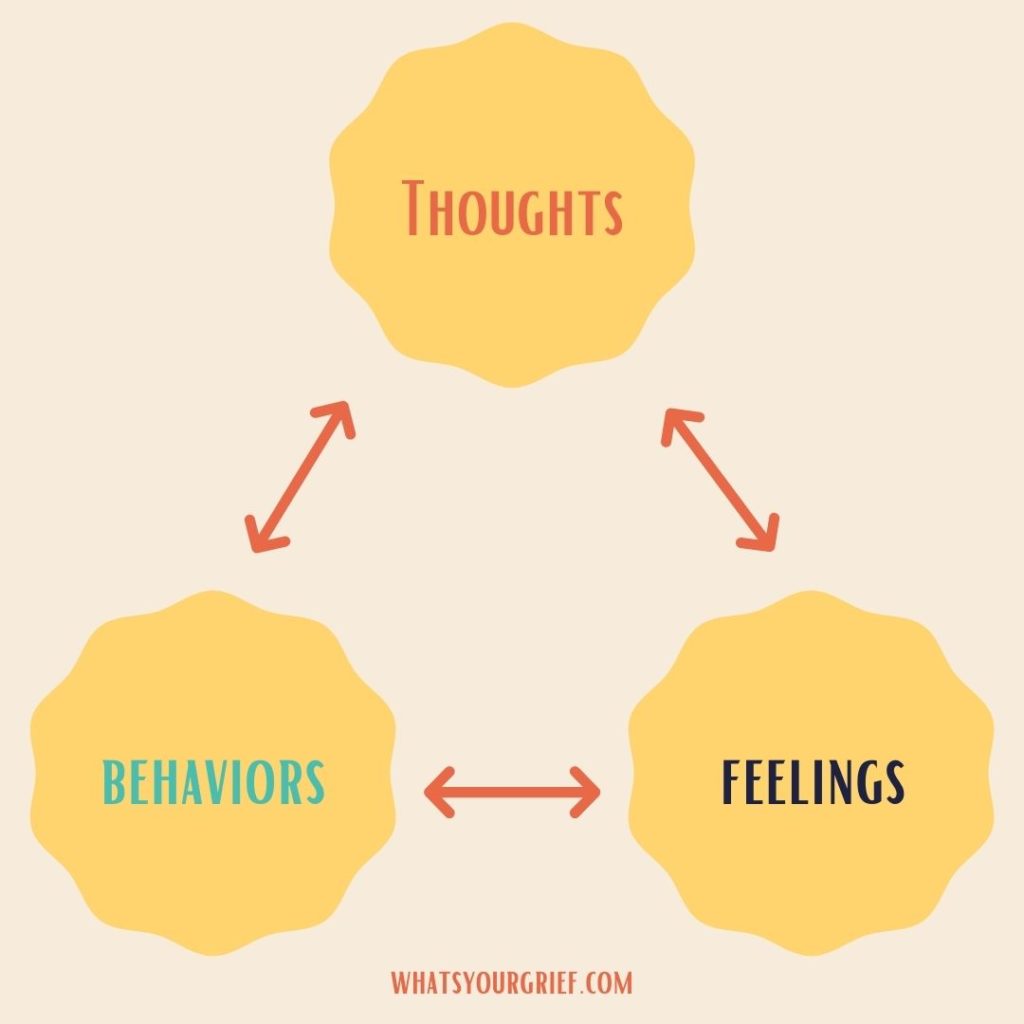Coping with Grief Using Dialectical Behavior Therapy (DBT)
/ Coping with Grief : Isabelle Siegel
For further articles on these topics:
Over the years, we’ve talked a lot about the different therapeutic approaches commonly used to manage grief. Despite our love for Dialectical Behavior Therapy (DBT) as a coping method for grief, we’ve never explicitly discussed the approach (although we have talked about dialectical thinking in grief, which you should definitely check out).
So what is DBT? In short, DBT is an offshoot of Cognitive Behavioral Therapy (CBT; For those of you who don’t know, CBT centers on the principle that our thoughts, feelings, and behaviors are fundamentally linked. If you’re interested in learning more about CBT, you can click here).

Like traditional CBT, DBT focuses on change: If we can change the way we think, we can change the way we feel. However, DBT adds something new: It also focuses on acceptance: We must accept the things we cannot change. Sounds a lot like some of the stuff you’ve read here at What’s Your Grief, doesn’t it?
DBT includes four modules—Mindfulness, Interpersonal Effectiveness, Emotion Regulation, and Distress Tolerance—each of which I could probably write an entire article about. And, on top of that, each module has a bunch of sub-skills. However, today I’ll focus on providing a general overview of DBT and how it can help you as a griever.
Mindfulness - An Accept Skill
We’ve talked a lot about mindfulness here at What’s Your Grief. According to the creator of DBT, Marsha Linehan, mindfulness is:
...the act of consciously focusing your mind in the present moment without judgment and without attachment to the moment.
Linehan, 2015
You can probably see where we’re going with this. Grief and mindfulness can sometimes seem like they’re at odds… But they don’t have to be.
When we grieve, we tend to live in the past (What if I had…?) or in the future (When will I move forward?). DBT asks us to focus on the present: to accept things as they are without judgment. Yes, that without judgment piece is crucial and, yes, it’s harder than it seems. You can read more about the importance of self-compassion here.
So what does mindfulness look like in grief? Next time you find yourself thinking “Gosh, I’ll never get through this,” try reminding yourself: “Yeah, this sucks… And I’m doing my best right now to cope.” ("And" is a key word in DBT!).
Interpersonal Effectiveness - A Change Skill
In this module, Linehan focuses on both getting what you want in relationships and nurturing relationships, all while maintaining self-respect. She uses several amazing acronyms, but today we’ll focus on the most popular: DEAR MAN.
DEAR MAN is an exercise Linehan invented to help people express their needs to others. It involves:
Describing the Situation
Expressing Feelings
Asserting Wishes
Reinforcing
(Staying) Mindful
Appearing Confident
Negotiating
So what does this look like for grievers? Well, that may depend on what your most basic grief need is. But here’s an example:
My friend just told me, “I thought you’d be over it by now” and doesn’t realize the impact it has on me. So I…
- Describe the Situation - You expressed the belief that my grief is something I need to “get over” or “move on from.”
- Express Feelings - This makes me feel like I’m a failure AND that you don’t respect how much this loss has affected me.
- Assert Wishes - I would appreciate it if you refrain from making such comments.
- Reinforce - I want you to consider how your comments will affect me before making them.
You also want to…
- (Stay) Mindful - Remain present and goal-oriented.
- Appear Confident - Don’t waver in your request.
- Negotiate - If necessary, negotiate!
Emotion Regulation - A Change Skill
According to Linehan, emotion regulation entails getting our emotions under control. Of course we can never fully control what we feel and when we feel it (and emotions are never good or bad), but Linehan provides some skills aimed at both understanding our emotions and decreasing the frequency of unpleasant ones.
We’ve talked a bit about keeping negative emotions in check before, but we love the exercises Linehan suggests to do so. There are many great ones, but today we’ll focus on just two.
- Check the Facts
In grief, our emotions are often motivated by our (sometimes inaccurate) interpretations of a scenario. “Check the Facts” is an exercise used to change our emotions by changing our interpretations. If that doesn’t make sense, here’s a quick example:
I feel guilty following my dog’s death.
Interpretation: I could have done more to prevent my dog’s death. If only I taken him to the vet earlier…
Check the Facts: I did everything I could to prevent my dog’s death. In reality, he wasn't having any symptoms that led me to think he needed to be taken earlier. Even if I had, taking him to the vet earlier would likely not have made a difference.
- Opposite Action
This is one of my favorite coping tools, especially for grievers. It involves acting opposite of how we feel and what our emotions are telling us to do.
While it’s sometimes healthy to wallow in grief, Opposite Action can come in handy when your grief is getting in the way of the life you want to be living. For example, if it’s been a while since your loss and you’re still turning down invites to join friends for dinner… but feelings of isolation/loneliness are starting to kick in... it may be time to challenge yourself to implement Opposite Action. Next time a friend invites you somewhere, you'll probably feel the urge to turn them down. This time, commit to making plans and throw yourself into them.
Distress Tolerance - An Accept Skill
This is probably my favorite module of DBT, particularly for grievers. According to Linehan, distress tolerance is:
the ability to perceive one's environment without putting demands on it to be different; to experience one's current emotional state without attempting to change it; and to observe one's own thoughts and action patterns without attempting to stop or control them.
Linehan, 1993, p. 147
You can probably see right off-the-bat why this is so important in grief. When we’re grieving, we usually can’t change the situation. We can’t undo the loss, we can’t take away the pain. That means it’s time to radically accept the situation for what it is. Perhaps most importantly, it means accepting that life can be worth living even in the presence of tremendous pain.
If this is hard to buy into, that’s totally okay. DBT in general is hard work, and it takes time to get to a place where acceptance feels possible. For now, keep these skills in mind, share your thoughts in the comments, and—as always—subscribe to What’s Your Grief.
We wrote a book!
After writing online articles for What’s Your Grief
for over a decade, we finally wrote a tangible,
real-life book!
What’s Your Grief? Lists to Help you Through Any Loss is for people experiencing any type of loss. This book discusses some of the most common grief experiences and breaks down psychological concepts to help you understand your thoughts and emotions. It also shares useful coping tools, and helps the reader reflect on their unique relationship with grief and loss.
You can find What’s Your Grief? Lists to Help you Through Any Loss wherever you buy books:





Marion July 12, 2022 at 7:03 pm
I lost my 32 year old son 18 months ago. Time stood still from that moment on…I mean that in a real sense, I’m aware the calender and clocks move but I do not. We had a close loving connected and wonderful relationship. I miss his beauty, his friendship….I miss him.
There is not one second in any day that I am not acutely aware of his absence or loss. In a sense I exist constantly in the knowledge of his absence. It is hell. For over a year I have refused to see family and friends except his dad and sisters. I felt that nobody understood the utter annihilation of our family. Platitudes made me so so angry. I burn with questions. Where is he. Is he ok. Am i still his mother. Will he reincarnate. I go about my day in a deadened state doing only what is necessary for survival. Nothing gets easier…it never ever will. My son died…my mothering feelings for my son did not. I have a daughter who I love as much as my son and she is the only reason I go on. To lose a child of any age is unbelievably cruel …I no longer trust the universe.
Sue W August 22, 2022 at 2:03 pm
Dear Marion,
This is exactly how I feel. I lost my only daughter 3/5/2022 at the age of 40 after a horrendous pancreatic cancer experience. She left behind her 5y.o. son who lives with me. Every word you wrote, I have thought. The platitudes are maddening. My friend of 50 years told me to stop complaining. The lump in my throat feels permanent.
Angela October 9, 2021 at 10:31 pm
I lost my dad on June 10 unexpectedly. He was breathing and talking, I went upstairs to go to bed, my mom heard a noise shortly after I went up. He died 2 minutes later while my mom was doing CPR and I was on the phone with 911. I still think of him daily. Family didn’t give us time to grieve privately and keep telling us we are doing things wrong. My friends are 2000 miles away.
Mary O'Halloran September 13, 2021 at 2:00 am
I too lost my dad on June 29th 2021, exactly 30 years to the day his own mother died. It is so difficult. I feel like I am drowning. Take Care everyone
Lois November 4, 2021 at 5:13 am
My 21 year old son died oct 1, 2021… 33 days ago. I cant continue living. I went to work for two hours yesterday. I only sleep an hour at a time. I’m awake for days sometimes, staring into silence or crying until I cant breathe. I dont understand how my heart still beats and his does not? I plan to spend the holidays drunk or working. Maybe both. #griefwench (my work appointed grief counselor) is useless. I cant feel my own chest pain, I know it’s there but my body is constantly cold and numb. Am I dead inside?
Litsa November 30, 2021 at 7:37 pm
Lois – 33 days is nothing in the timeline of grief. Please know that in the early weeks and months it can feel absolutely impossible but you can and will survive, unimaginable as it seems. There is no easier answer, counseling can feel like it isn’t helping, but so often there are tiny, almost imperceptible, shifts happening as you learn to survive this loss. The loss may never get lighter but most people find that they do get stronger, better able to carry it. But this often takes more time than we imagine it will. As a counselor myself, I encourage you to discuss with your counselor that you aren’t happy with counseling. There are many different strategies and approaches to counseling, but a counselor may not know if things are effective if they don’t get that feedback. Obviously counseling is limited each week, but please know you can reach someone 24/7 at the suicide prevention line 800-273-8255 if you are ever feeling like you can’t go on or just need someone to talk to. There is always help and support and, hard as it is to believe, there are others who have been in your place, survived, and who want to connect for support. The compassionate friends and the bereaved parents of the USA are good groups for this.
Nancy August 25, 2021 at 4:15 pm
My husband died suddenly Aug. 7th. I too am devastated. I do not want to do Xmas this year.
Suicide is nothing to be ashamed of.
Joyce July 31, 2021 at 10:39 pm
I did DBT years ago but I am having a very hard time with accepting my husband’s death. He took his own life three years ago. I am still numb and in shock. I have been talking to a grief counsellor on the phone (because of COVID). I know I have a lot of emotions buried deep, but I can’t feel them. I want to. A few times in the last few months I’ve almost started to cry but either I was told “Don’t cry, just cheer up!” or that I’m “wallowing in self-pity” I am not wallowing in self-pity.
My family has so much stigma around suicide. They told me to tell people that he had “health problems” I’m not ashamed of it. I want to talk about it and get rid of stigma.
Thorpuppy August 3, 2021 at 11:48 pm
Joyce,
I am so sorry about the loss of your husband. I agree that there is too much stigma when it comes to suicide as well as mental illness. I have fortunately not had a loved one commit suicide, but I recently lost my mom June 29th 2021, to a very quick illness. She had bi polar depression and anxiety disorder for most of my life. She was only 71.
There is nothing to be ashamed of. It was not your fault. Please try and remember that. I am sure your husband loved you, and would want you to be able to be happy again. Hang in there. Talking to a therapist is a great thing, and takes a lot of courage. Keep up with that and hang in there! God Bless you and many prayers 🙏!
Sue August 23, 2021 at 9:49 pm
I have lost my husband on the same day as your mom, June 29th 2021. I’m dreading the holidays and don’t want to be home to celebrate.